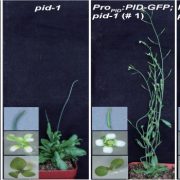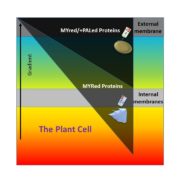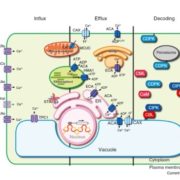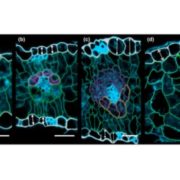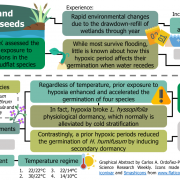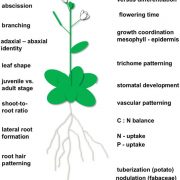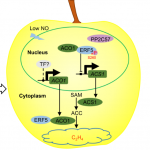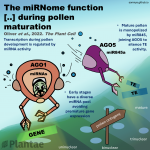The MIEL1-ABI5/MYB30 regulatory module fine tunes abscisic acid signaling during seed germination (JIPB)
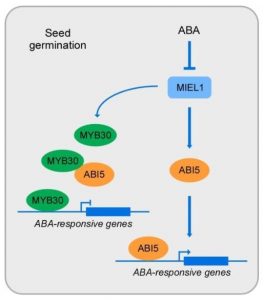 Abscisic acid (ABA) is a phytohormone that plays a crucial role in the inhibition of seed germination, and the transcription factor ABI5 is the final and common downstream factor that represses germination. Many proteins are known to inhibit ABI5, such as the mediator complex subunit MED25 or other transcription factors, but how these proteins interact and function together to properly regulate ABA response levels during germination is still unknown. In this work, Nie et al. suggest a regulatory module that precisely regulates ABA signaling during seed germination by controlling ABI5 activity. The authors identified a RING-type ubiquitin E3 ligase MYB30-INTERACTING E3 LIGASE 1 (MIEL1) and its target MYB30 as ABI5-interacting proteins. For seed germination to proceed, the inhibition of MIEL1 releases MYB30, which restricts ABA responses by inhibiting both the activity of ABI5 and the transcription of ABA-responsive genes. If ABA accumulates, MIEL1 shows decreased stability, which also produces a weakened interaction between MIEL1 and ABI5, releasing ABI5 and the transcription of ABA-responsive genes. This work sheds light on the stability and transcriptional activity of ABI5 during germination. (Summary by Eva Maria Gomez Alvarez, @eva_ga96) J. Integr. Plant Biol. 10.1111/jipb.13234
Abscisic acid (ABA) is a phytohormone that plays a crucial role in the inhibition of seed germination, and the transcription factor ABI5 is the final and common downstream factor that represses germination. Many proteins are known to inhibit ABI5, such as the mediator complex subunit MED25 or other transcription factors, but how these proteins interact and function together to properly regulate ABA response levels during germination is still unknown. In this work, Nie et al. suggest a regulatory module that precisely regulates ABA signaling during seed germination by controlling ABI5 activity. The authors identified a RING-type ubiquitin E3 ligase MYB30-INTERACTING E3 LIGASE 1 (MIEL1) and its target MYB30 as ABI5-interacting proteins. For seed germination to proceed, the inhibition of MIEL1 releases MYB30, which restricts ABA responses by inhibiting both the activity of ABI5 and the transcription of ABA-responsive genes. If ABA accumulates, MIEL1 shows decreased stability, which also produces a weakened interaction between MIEL1 and ABI5, releasing ABI5 and the transcription of ABA-responsive genes. This work sheds light on the stability and transcriptional activity of ABI5 during germination. (Summary by Eva Maria Gomez Alvarez, @eva_ga96) J. Integr. Plant Biol. 10.1111/jipb.13234


